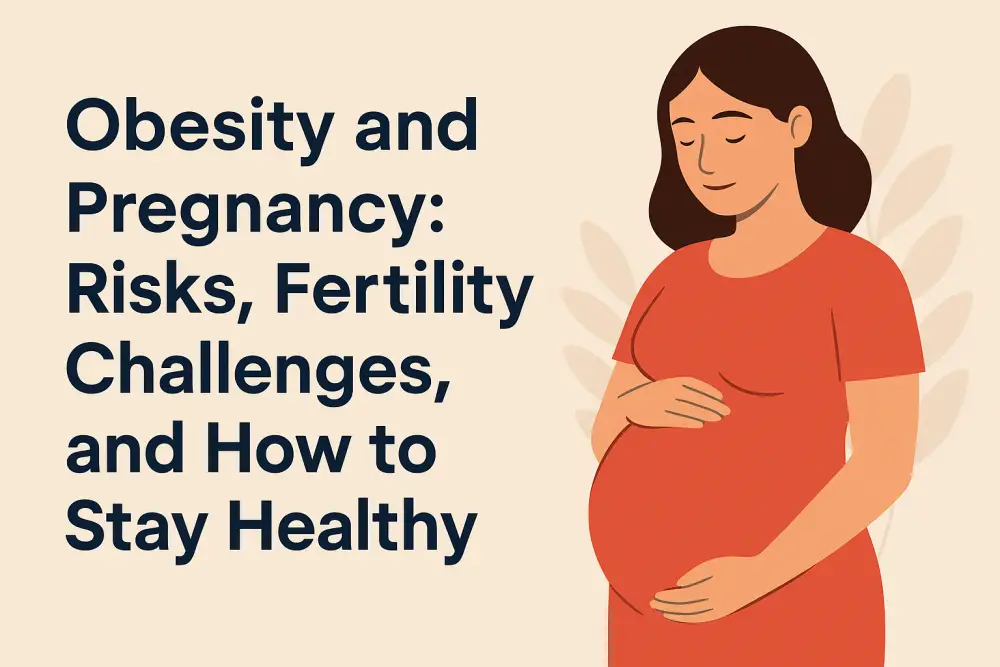Obesity is a well-known health concern, but its impact on pregnancy and fertility is often underestimated. Gestational obesity can have serious consequences for both the mother and the baby. From complications during pregnancy to reduced fertility rates, obesity can significantly affect the ability to conceive and carry a pregnancy to term. Understanding these risks is crucial for women planning to become pregnant or those who are already expecting.
1. Obesity’s Impact on Reproductive Health
Obesity is strongly linked to a growing number of reproductive health problems. It increases the likelihood of infertility, reproductive endocrine disorders, and a higher risk of cancers affecting the breast, cervix, uterus, and ovaries. These conditions not only make conception more difficult but can also lead to complications during pregnancy.
2. How Obesity Affects Fertility
Obesity is one of the major factors contributing to infertility. Excess body fat alters hormone levels, disrupting the delicate hormonal balance required for conception. It also decreases the success rates of in vitro fertilization (IVF). Even when embryos are fertilized in a lab, women with obesity often face challenges with implantation, making it harder for the pregnancy to continue successfully.
3. The Role of BMI in Fertility and Pregnancy
A woman’s Body Mass Index (BMI) is a key indicator of fertility and pregnancy health. A BMI between 20–25 is considered healthy. A BMI over 25 is overweight, and a BMI of 30 or higher indicates obesity. Women with a BMI above 35 experience lower success rates with fertility treatments, and the likelihood of embryo implantation decreases significantly. Maintaining a healthy BMI improves fertility and overall pregnancy outcomes.
4. Pregnancy Complications Due to Obesity
Obesity during pregnancy increases the risk of serious complications that can affect both mother and baby, such as:
- Gestational Diabetes: Can lead to excessive weight gain in the fetus.
- Pre-eclampsia: A dangerous condition with high blood pressure, 4–5 times more common in obese women.
- Sleep Apnea: Can negatively affect maternal and fetal health.
- Stillbirth: Obese women face 2–3 times higher risk.
- Miscarriage and Fetal Anomalies: More likely in overweight and obese pregnant women.
- Extended Hospitalization: Both mother and baby may need longer hospital stays or NICU care.
- Post-Delivery Infections: Higher risk due to C-sections, blood clots, and surgical complications.
5. Impact of Obesity on the Baby
Babies born to obese mothers are more likely to face health challenges, including:
- Macrosomia: Excessive birth weight leading to difficult labor.
- Neural Tube Defects: Conditions such as spina bifida, often harder to detect in obese mothers.
- Long-Term Health Risks: Higher likelihood of developing obesity and metabolic disorders later in life.
6. Taking Proactive Steps to Manage Obesity
For women planning pregnancy, addressing weight management beforehand is vital. A balanced diet, regular exercise, and medical guidance can improve fertility outcomes and reduce pregnancy complications. Women who are already pregnant should consult healthcare providers for a safe weight management plan to ensure the best outcomes for both mother and baby.
Conclusion: Prioritize Your Health for a Safer Pregnancy
Obesity during pregnancy is linked to complications that can affect both the mother and child. By understanding these risks, women can take steps to improve fertility, reduce pregnancy complications, and promote healthier outcomes. Whether planning to conceive or already pregnant, adopting a healthy lifestyle is the key to ensuring a safe pregnancy journey.

